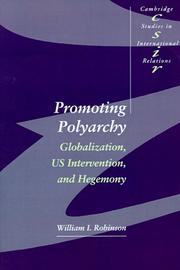| Listing 1 - 8 of 8 |
Sort by
|
Book
ISBN: 9780190277628 9780190277635 0190277637 0190277629 Year: 2016 Publisher: New York (N.Y.): Oxford university press,
Abstract | Keywords | Export | Availability | Bookmark
 Loading...
Loading...Choose an application
- Reference Manager
- EndNote
- RefWorks (Direct export to RefWorks)
"In Populism's Power, Laura Grattan looks at how populism cultivates the aspirations of ordinary people to exercise power over their everyday lives and their collective fate. She considers a range of populist moments and reopens the idea that grassroots movements can play a key role in democratizing power and politics in America"--
Book
ISSN: 12961787 ISBN: 9782748904628 2748904621 Year: 2021 Publisher: Marseille: Agone,
Abstract | Keywords | Export | Availability | Bookmark
 Loading...
Loading...Choose an application
- Reference Manager
- EndNote
- RefWorks (Direct export to RefWorks)
Nos leaders d’opinion ont une théorie pour expliquer les comportements de certains de nos concitoyens, qui exaltent la sagesse des foules ― et, cela va de soi, sont racistes, sexistes et homophobes. Ces égarés, assurent-ils, agissent sous l’emprise d’une doctrine rétrograde, le « populisme » ; et leurs adeptes sont des bourrins incultes qui ont une dent contre leurs congénères instruits. Le populisme est en guerre contre la pensée moderne et le progrès. Il est complice de la diffusion du mal, pour ne pas dire qu’il est le mal lui-même.La façon dont nos progressistes autoproclamés mésusent et abusent désormais du mot « populisme » prouve qu’ils se sont résolument tournés contre leur héritage démocratique. La démocratie pose un problème, expliquent-ils, parce qu’elle permet au peuple de faire fi de l’autorité des experts.Le paysage politique est cul par-dessus tête, mais le combat reste le même : le vrai sujet, ce sont les privilèges des élites, et le populisme est peut-être le remède permettant de nous en délivrer.
Populism --- Political culture --- Social movements --- Democracy --- History --- Populisme. --- Populisme --- Populism - United States - History --- Political culture - United States - History --- Social movements - United States - History --- Democracy - United States - History --- Histoire.
Book
ISBN: 9780761863144 9780761863151 0761863141 076186315X Year: 2014 Publisher: Lanham, Md.: University press of America,
Abstract | Keywords | Export | Availability | Bookmark
 Loading...
Loading...Choose an application
- Reference Manager
- EndNote
- RefWorks (Direct export to RefWorks)
Political philosophy. Social philosophy --- Tocqueville, de, Alexis --- Democracy --- Political participation --- Tocqueville, Alexis Charles Henri Maurice Clérel de Tocqueville (1805-1859) --- History --- 4798 --- Tocqueville, Alexis de, --- Criticism and interpretation --- Tocqueville, Alexis Charles Henri Maurice, --- Democracy - European Union countries --- Democracy - United States - History --- Tocqueville, Alexis de, - 1805-1859 --- Tocqueville, Alexis de, - 1805-1859 - Criticism and interpretation --- Tocqueville, Alexis Charles Henri Maurice, 1805-1859
Book
ISBN: 0674058968 9780674058965 9780674048973 0674048970 9780674284333 9780674284333 067428433X 067428433X Year: 2010 Publisher: Cambridge, Mass. : Harvard University Press,
Abstract | Keywords | Export | Availability | Bookmark
 Loading...
Loading...Choose an application
- Reference Manager
- EndNote
- RefWorks (Direct export to RefWorks)
This is a sweeping new interpretation of the national experience, reconceiving key political events from the Revolution to the New Deal. Rana begins by emphasizing that the national founding was first and foremost an experiment in settler colonization. For American settlers, internal self-government involved a unique vision of freedom, which combined direct political participation with economic independence. However, this independence was based on ideas of extensive land ownership which helped to sustain both territorial conquest and the subordination of slaves and native peoples. At the close of the nineteenth century, emerging social movements struggled to liberate the potential of self-rule from these oppressive and exclusionary features. These efforts ultimately collapsed, in large part because white settlers failed to conceive of liberty as a truly universal aspiration. The consequence was the rise of new modes of political authority that presented national and economic security as society’s guiding commitments. Rana contends that the challenge for today’s reformers is to recover a robust notion of independence and participation from the settler experience while finally making it universal.
Frontier and pioneer life --- Liberty --- Imperialism --- Political culture --- Democracy --- Hegemony --- Hegemonism --- Political science --- Sociology --- Unipolarity (International relations) --- History. --- United States --- Politics and government. --- Territorial expansion. --- Annexations --- Government --- History, Political --- Frontier and pioneer life - United States --- Liberty - History --- Imperialism - History --- Political culture - United States - History --- Democracy - United States - History --- Hegemony - United States - History --- Etats-Unis --- United States - Politics and government --- United States - Territorial expansion
Book
ISBN: 1139930869 1139929631 113993385X 1139937057 113993936X 051183795X 0511665008 9781139939362 9780511665004 0521772338 9780521772334 052177604X 9780521776042 052177604X 9780521776042 9781139930864 9781139929639 9781139937054 9781139933858 9780511837951 Year: 2000 Publisher: Cambridge [England] New York
Abstract | Keywords | Export | Availability | Bookmark
 Loading...
Loading...Choose an application
- Reference Manager
- EndNote
- RefWorks (Direct export to RefWorks)
In the late nineteenth century, the United States underwent an extremely rapid industrial expansion that moved the nation into the front ranks of the world economy. At the same time, the nation maintained democratic institutions as the primary means of allocating political offices and power. The combination of robust democratic institutions and rapid industrialization is rare and this book explains how development and democracy coexisted in the United States during industrialization. Most literature focuses on either electoral politics or purely economic analyses of industrialization. This book synthesizes politics and economics by stressing the Republican party's role as a developmental agent in national politics, the primacy of the three great developmental policies (the gold standard, the protective tariff, and the national market) in state and local politics, and the impact of uneven regional development on the construction of national political coalitions in Congress and presidential elections.
Democracy -- United States -- History -- 19th century. --- Industrialization -- United States -- History -- 19th century. --- United States -- Economic conditions -- 1865-1918. --- Industrialization --- Democracy --- Business & Economics --- Economic History --- Self-government --- Political science --- Equality --- Representative government and representation --- Republics --- Industrial development --- Economic development --- Economic policy --- Deindustrialization --- History --- United States --- Economic conditions --- E-books --- Arts and Humanities

ISBN: 0520204417 0520216601 Year: 1997 Publisher: Berkeley ; Los Angeles ; London University of California Press
Abstract | Keywords | Export | Availability | Bookmark
 Loading...
Loading...Choose an application
- Reference Manager
- EndNote
- RefWorks (Direct export to RefWorks)
Political participation --- Political culture --- Democracy --- City and town life --- Participation politique --- Culture politique --- Démocratie --- Vie urbaine --- History --- Histoire --- United States --- New York (N.Y.) --- New Orleans (La.) --- San Francisco (Calif.) --- Etats-Unis --- La Nouvelle-Orléans (Louis.) --- Politics and government --- Politics and government. --- Politique et gouvernement --- Démocratie --- La Nouvelle-Orléans (Louis.) --- 19th century --- To 1898 --- New Orleans, La. --- Political participation - United States - History - 19th century. --- Democracy - United States - History - 19th century. --- City and town life - United States - History - 19th century.
Book
ISBN: 1108216455 1108207006 1316591263 1107152445 1316606589 9781107152441 9781316606582 9781316606582 9781316591260 Year: 2017 Publisher: Cambridge: Cambridge university press,
Abstract | Keywords | Export | Availability | Bookmark
 Loading...
Loading...Choose an application
- Reference Manager
- EndNote
- RefWorks (Direct export to RefWorks)
"How did the acquisition of overseas colonies affect the development of the American state? How did the constitutional system shape the expansion and governance of American empire? American Imperialism and the State offers a new perspective on these questions by recasting American imperial governance as an episode of state building. Colin Moore argues that the empire was decisively shaped by the efforts of colonial state officials to achieve greater autonomy in the face of congressional obstruction, public indifference, and limitations on administrative capacity. Drawing on extensive archival research, the book focuses principally upon four cases of imperial governance--Hawai'i, the Philippines, the Dominican Republic, and Haiti--to highlight the essential tension between American mass democracy and imperial expansion"--
United States --- Imperialism --- Colonies --- Nation-building --- Democracy --- Constitutional history --- Stabilization and reconstruction (International relations) --- State-building --- Political development --- Foreign relations --- Territorial expansion. --- History. --- Colonial question. --- Politics and government --- United States - Foreign relations - 1865-1921 --- United States - Territorial expansion --- Imperialism - History --- Colonies - History --- Nation-building - United States - History --- Democracy - United States - History --- Constitutional history - United States --- United States - Colonial question --- United States - Politics and government - 1865-1933

ISBN: 0521566916 0521562031 0511559127 9780521566919 9780511559129 9780521562034 Year: 1996 Publisher: Cambridge Cambridge University Press
Abstract | Keywords | Export | Availability | Bookmark
 Loading...
Loading...Choose an application
- Reference Manager
- EndNote
- RefWorks (Direct export to RefWorks)
Promoting Polyarchy is an exciting, detailed, and controversial work on the apparent change in US foreign policy from supporting dictatorships to an 'open' promotion of 'democratic' regimes. William I. Robinson argues that behind the facade of 'democracy promotion', the policy is designed more to retain the elite-based and undemocratic status quo of Third World countries than to encourage mass aspirations for democratization. He supports this challenging argument with a wealth of information garnered from field work and hitherto unpublished government documents, and assembled in case studies of the Philippines, Chile, Nicaragua, Haiti, South Africa, and the former Soviet Bloc. With its combination of theoretical and historical analysis, empirical argument, and bold claims, Promoting Polyarchy is an essential book for anyone concerned with democracy, globalization and international affairs.
International relations. Foreign policy --- Political systems --- United States --- 800 Collectie Vlaams Vredesinstituut --- 810 Theorie en Methode --- 824 Globalisering --- 826 Imperialisme, Kolonialisme --- 831 Internationale Politieke Economie --- 841.1 Democratisering --- 855.4 Militaire interventies --- 856.7 Sancties --- 882.1 Caraïben --- 882.2 Zuid-Amerika --- 882.3 Midden-Amerika --- 882.4 Noord-Amerika --- 883.3 Zuidoost-Azië --- Democracy --- World politics --- History --- Self-government --- Political science --- Equality --- Representative government and representation --- Republics --- Foreign relations --- Social Sciences --- Political Science --- Democracy - History - 20th century --- Democracy - United States - History - 20th century --- World politics - 1985-1995 --- United States - Foreign relations - 1981-1989 --- United States - Foreign relations - 1989 --- -Democracy --- United States of America
| Listing 1 - 8 of 8 |
Sort by
|

 Search
Search Feedback
Feedback About UniCat
About UniCat  Help
Help News
News